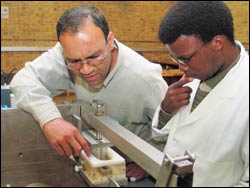New honours course provides fresh career opportunities
01 December 2003
Men at work: In the materials engineering laboratory Dr Kashif Marcus (left) and Nkosana Klaas adjust the reciprocating wear tester to simulate the wear behaviour in bearings and seals. A new BSc (honours) course in materials science will be launched next year.
The Faculty of Engineering and the Built Environment has announced plans to launch a new BSc honours degree in materials science, a move that has been met with enthusiasm from industry and government.
The course will be offered by the mechanical engineering department and will be suitable for graduates in chemistry, physics and geology, providing these candidates with opportunities to pursue careers in the burgeoning materials and manufacturing industries.
It has been developed in close consultation with organisations such as the Centre for Scientific and Industrial Research (CSIR), mining giant Mintek and SASOL, with its by-products such as rubber and non-metals. The one-year programme includes courses in manufacturing with materials, materials failure analysis and professional communications.
Students will be required to complete a research project, either at UCT or in the laboratory of a sponsoring organisation.
Course convenor Associate Professor Candy Lang said materials science and technology had been identified by government and the Materials Manufacturing Foresight Programme as scarce skills.
"The new Advanced Manufacturing Technology Strategy, which is emerging at government level, for example, sees materials as an important, cross-cutting technology," Lang said.
"Advanced materials is an identified technology focus area in the automotive, metals, minerals, chemical and even cultural and crafts industries."
In many cases it is not merely a question of developing new materials but getting the most out of existing ones. In the automotive industry, for example, South Africa is exporting stainless steel motor components and there is a need to improve the processing and manufacturing of current materials. There has also been much development in the manufacture of magnesium alloys, producing new lightweight materials that are also more environmentally friendly.
The synthesis of new materials generally involves chemical and/or solid state reactions, and the physical sciences graduate is well qualified in this regard, she added. "However, the design of new materials is application driven and therefore it is important that a firm understanding of material-structure-property-processing relationships is developed to build on underlying chemistry and physical principles."
For example, corrosion is the result of electrochemical reactions, but a knowledge of the material structure and corrosion mechanisms is needed to improve corrosion resistance.
Although the course has place for 20 to 30 students, the plan is to kick off with 10 next year, Lang said. The core materials courses include metallics, ceramics, polymerics and composites. The programme involves a structured curriculum of 36 course work credits. This will include a major research project with practical training on experimental techniques.
For more information, visit the website www.mateng.uct.ac.za or contact Lang on 650-3675/3172, e-mail clang@ebe.uct.c.za.
 This work is licensed under a Creative Commons Attribution-NoDerivatives 4.0 International License.
This work is licensed under a Creative Commons Attribution-NoDerivatives 4.0 International License.
Please view the republishing articles page for more information.
Related
How oceans recover after global catastrophe
19 Jan 2026
Alderman Owen Kinahan (1955–2026)
06 Jan 2026










